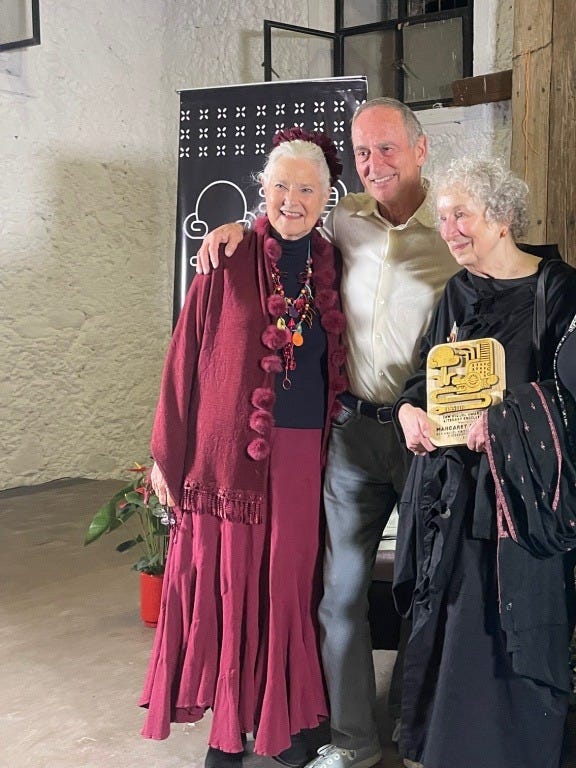An Evening with Margaret Atwood in San Miguel de Allende
Wit, Warnings, and What’s Next
I had the privilege of attending a conversation between the legendary Margaret Atwood and war correspondent Martin Fletcher earlier this week, in my enchanting town of San Miguel de Allende, Mexico. Hosted as a kick-off to the annual San Miguel Writers’ Conference (< If you aren’t familiar with the SMA Writer’s Conference, it is among the best. Check it out!). The evening was a thought-provoking exploration of literature, history, and our current cultural landscape.
The talk, titled, From Fiction to Reality: Has Our Dystopian Future Arrived? covered a gamut of territories, decades, and eras in human evolution—to a packed house eager to hear from the sharp-tongued grand dame of dystopian literature.
As the conversation kicked off, one question seemed to hover over the room: Are we hurtling toward the dystopian patriarchy Atwood envisioned in The Handmaid’s Tale?
Her response? “I don’t think we’ll get the uniforms.”
Atwood, with her signature mix of wit and piercing intellect, unpacked the origins of her seminal novel, The Handmaid’s Tale, written during the Reagan era. The rise of the religious right and its attempts to reframe power dynamics inspired her exploration of what happens when women are stripped of agency. Atwood’s reflections on second-wave feminism highlighted the movement’s advocacy for sexual liberty and gender equality beyond suffrage, emphasizing the era’s significant societal shifts.
“The election of Ronald Reagan,” she explained, “brought a wave of rhetoric about sending women back into the home. But how do you do that after they’ve had a taste of credit cards and jobs? You cut off their money and power.”
In her characteristic style, Atwood zoomed out to historical context. Her astute observations on history’s cycles and the precarious balance of societal progress informed by looking through a Victorian bonnet or an Afghani burka—both restricting vision to a narrow frame. The United States, she noted, began as a theocracy, and the nostalgia often romanticized by today’s conservative rhetoric—the 1950s—is a fiction for those who weren’t there. “It’s a belief in a golden past that never really existed,” she said.
From left: Susan Page, Martin Fletcher, Margaret Atwood
Martin Fletcher, who has covered conflicts from Kosovo to Rwanda, was the perfect sparring partner. Playing the straight man to Atwood’s razor-sharp commentary, he drew her into discussions about contemporary dystopias. “We seem to be undergoing a Machiavellian Renaissance,” Atwood noted, describing the current political landscape as a wheel of fortune turning, its revolutions dictated by power, not ideology.
She didn’t shy away from religion, either, calling out the Christian National movement for its emphasis on vengeance over forgiveness, saying, “If you actually read the Bible—and a lot of them haven’t—you’ll see Jesus was about forgiving your neighbor, not frying them in hell.”
Atwood also reflected on the cultural and political resonance of The Handmaid’s Tale. She recounted its 1989 Berlin Film Festival debut, held as the Berlin Wall was falling. In West Berlin, the screening felt celebratory. In East Berlin, the audience was somber. When Atwood asked why, someone replied, “This movie has been our life.”
As for the dystopian future Atwood once imagined, she’s less concerned with prophecy and more with patterns. “I’m not a prophet. I’m just old and very patient,” she quipped. Then, with a literary twist, Atwood noted: “The inauguration hasn’t even happened yet—give it three months, and we’ll know what movie we’re in.” Are we headed for Game of Thrones chaos? A Shakespearean Macbeth? Or maybe a Julius Caesar-style betrayal?
The conversation closed on utopias, with Atwood remarking on their impracticality. She also referenced works like Marge Piercy’s Woman on the Edge of Time and how it explored utopia vs dystopia, gender roles vs feminism, mental health and oppression, hope and resistance. Then tying that back to a reflecting on the tarot card The Wheel of Fortune and revolutions sparked by the turning wheel of history—a theme that feels eerily relevant today.
The evening was a masterclass in wit and wisdom from a writer whose work has long held a mirror to society. With her signature blend of humor and unflinching honesty, Atwood offered no easy answers, only sharp observations. When asked what we should do about the world we find ourselves in, her advice was classic Atwood: “I’m not an activist. I’m a writer with opinions who will not shut up.”
Here’s hoping she never does.
For a deeper understanding of Atwood’s perspectives on democracy and societal issues, you may find her talk, “Margaret Atwood: Democracy Under Her Eye,” insightful.


